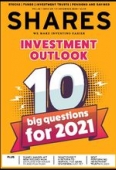Archived article
Please note that tax, investment, pension and ISA rules can change and the information and any views contained in this article may now be inaccurate.
Why aren’t investors cheering AstraZeneca’s bid for Alexion?

At first glance AstraZeneca’s (AZN) $39.4 billion takeover offer for immunology and rare diseases specialist Alexion looks to be opportunistic and financially sound, but investors initially marked its shares down by 6%.
There are a couple of reasons for the negative reaction; firstly, investors have questioned why AstraZeneca needs to go down the mergers and acquisition route when it already boasts sector leading growth.
Secondly, despite the 45% premium to the prior closing price, there is a risk that other, better suited bidders may enter the fray and force up the price.
Alexion’s shares were trading at a 40% discount to the sector average before the bid according to broker Shore Capital which believes Alexion had been up for sale for some time.
Other players that already have some exposure to the fast-growing rare diseases market include Sanofi, Biogen, Pfizer and Novartis, all with arguably more need to bolster growth, says Shore Capital.
AstraZeneca already has a superior growth outlook which is reflected in its forward price to earnings ratio of 22, a 40% premium to global peers. If the deal goes ahead unchallenged it would represent a very good transaction in purely financial terms.
Management has targeted annual synergies of $500 million a year from the third year after completion (which is expected to be the third quarter of 2021). There will be an associated $600 million cash cost to delivering those benefits over the first three years.
AstraZeneca is effectively using its highly rated shares to part purchase a business trading at a discount, while also squeezing out costs and diversifying its core cancer franchise.
Management described the deal as ‘the right asset at the right price’ highlighting strong accretion with a double-digit percentage increase to core earnings per share in the first three years after completion.
Strong cash generation would also allow a fast paydown of the $13.5 billion in debt taken on to part fund the purchase.
Alexion has a portfolio of therapies for the treatment of rare diseases caused by an uncontrolled activation of the part of the immune system which produces antibodies that remove damaged cells.
The company’s discounted valuation to the US biotech sector reflected product concentration with roughly 90% of its $5 billion revenues coming from key drug Soliris, the leading treatment for the rare mediated blood disorder paroxysmal nocturnal hemoglobinuria.
AstraZeneca will help Alexion build out the development pipeline of drugs and use its global distribution footprint to add marketing heft while also using its scale to reduce manufacturing costs.
Shore Capital estimates that Alexion would add around $5 billion to $6 billion of revenues and $3 billion to $4 billion of EBITDA (earnings before interest, tax, depreciation and amortisation) to the enlarged group.
Important information:
These articles are provided by Shares magazine which is published by AJ Bell Media, a part of AJ Bell. Shares is not written by AJ Bell.
Shares is provided for your general information and use and is not a personal recommendation to invest. It is not intended to be relied upon by you in making or not making any investment decisions. The investments referred to in these articles will not be suitable for all investors. If in doubt please seek appropriate independent financial advice.
Investors acting on the information in these articles do so at their own risk and AJ Bell Media and its staff do not accept liability for losses suffered by investors as a result of their investment decisions.
Issue contents
First-time Investor
Great Ideas
Great Ideas Update
Investment Trusts
Money Matters
News
- Surge in Airbnb and DoorDash stock renews tech bubble debate
- Marketing of high-risk mini-bonds banned from 2021
- Why aren’t investors cheering AstraZeneca’s bid for Alexion?
- Aberdeen Standard snares Tritax as logistics property boom continues
- Disney shares hit new record high on plans for major TV and film push
- Iron ore trumps gold as the hot commodity of 2020

 magazine
magazine








